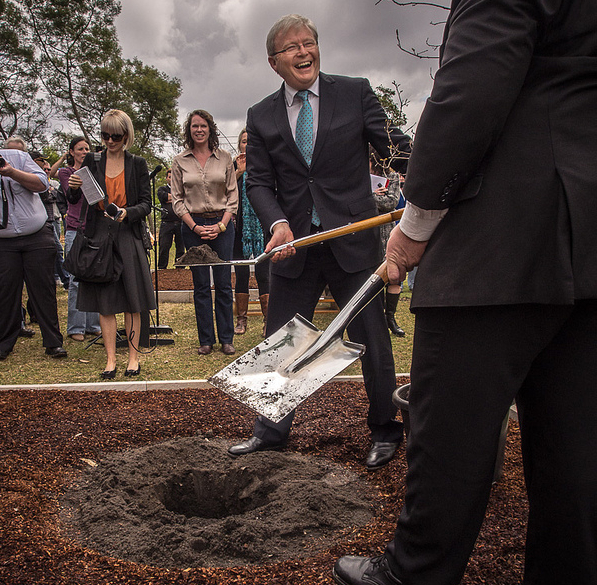 In a recent article in the Security Challenges Journal, I set out the case for analysing Defence White Papers in their political contexts. These statements are as much about the contest of politics as they are about policy. The success or failure of White Papers depends on the survival of the Ministers, Prime Ministers and Governments that produce them. So it is that the content of the 2009 and 2013 White Papers are intimately tied to the political aims and objectives of the Prime Ministers of the day.
In a recent article in the Security Challenges Journal, I set out the case for analysing Defence White Papers in their political contexts. These statements are as much about the contest of politics as they are about policy. The success or failure of White Papers depends on the survival of the Ministers, Prime Ministers and Governments that produce them. So it is that the content of the 2009 and 2013 White Papers are intimately tied to the political aims and objectives of the Prime Ministers of the day.
In 2009 then PM Rudd put forward a document (PDF) with a tough-edged strategic assessment and a somewhat pessimistic view of regional security prospects. The document said ‘the pace, scope and structure of China’s military modernisation have the potential to give its neighbours cause for concern if not carefully explained’ (paragraph 4.25) and also discussed measures the ADF might need to take in the event that a ‘major power adversary’ sought to operate ‘in our approaches’. (8.45) From this flowed plans to double the submarine fleet, significantly expand the Navy’s surface capabilities, all backed by long term projections for defence spending growth.
How quickly things change. Julia Gillard’s 2013 White Paper reversed course on much of the substance and some of the rhetoric of the 2009 statement. The language on China was sensibly softened, because the aim of white papers shouldn’t be to create enmity. A more positive caste was put on prospects for regional security, one that helpfully (for the Government) made the case for lower planned levels of defence spending. The 2013 Defence White Paper sets out a very different strategic world view from the 2009 version. As I described it in Security Challenges:
The reader was left wondering how a government could produce two such differently toned documents as the 2009 White Paper and the [2012] Asian Century White Paper. The answer, of course, is that the shift from Kevin Rudd to Julia Gillard had brought fundamental changes to Australia’s strategic policy. The Asian Century statement was a decisive policy rejection of the 2009 White Paper’s more pessimistic assessment of the prospects for regional security. Through the 2012 statement Julia Gillard put her personal stamp on the government’s external policies. This was the White Paper which Gillard ‘owned’, and in it she distanced herself from Rudd’s legacy, weakening the case for higher levels of defence spending.
The Asian Century White Paper set the context for the Defence White paper which followed. What then should we make of the prospects for Defence White Paper 2013 after the return of Mr Rudd to the Prime Ministership? It seems unlikely that Mr Rudd has changed his thinking about the strategic outlook. Indeed in the March/April 2013 issue of Foreign Affairs, Rudd’s article, ‘Beyond the Pivot’ (paywalled here, but available here) reinforces his more pessimistic assessment of regional security. He writes of the urgency of improving US-China relations:
Improving relations, moreover, is increasingly urgent, since the profound strategic changes unfolding across the region will only make life more complicated and throw up more potential flash points. Allowing events to take their own unguided course would mean running major risks, since across Asia, the jury is still out as to whether the positive forces of twenty-first-century globalization or the darker forces of more ancient nationalisms will ultimately prevail.
This is not ‘the relatively benign global landscape’ of Julia Gillard’s National Security Strategy (page 9). Nor is it a strategic outlook in which it makes sense to spend less on defence. China, says Rudd in Foreign Affairs, ‘respects strategic strength and is contemptuous of vacillation and weakness’. Such thinking underpinned the planned growth in maritime capability set out in 2009.
Mr Rudd is nothing if not a policy pragmatist, and his focus is unlikely to turn to defence policy between now and the election. But it’s difficult to imagine that he’ll have much sympathy for either the strategic outlook or the budget settings of the 2013 Defence White Paper. Prime Ministers tend to get attached to the white papers they developed—after all, they live through the experience of discussing them in Cabinet. For Rudd that means the 2009 White Paper is probably top of mind.
So after the election, Defence might expect the call to develop a new white paper. We’ve long known that’s the opposition’s plan, but it would likely also be the case with a returned Rudd Government. Just when you thought it was safe to go back in the water.
Peter Jennings is executive director of the Australian Strategic Policy Institute. Image courtesy of Flickr user Michael Rawle.

